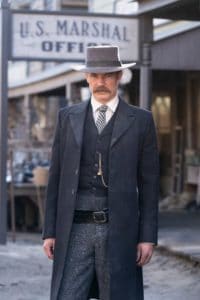Deadwood was one of the best television series ever. Despite its many awards, HBO pulled the plug after only three seasons. After the abrupt stop, HBO promised to Deadwood to end appropriately through two TV films. However, despite fan requests and actor insistence, the promises never materialised. Until now. After more than a decade, the final chapter has finally arrived. Deadwood gets the fitting conclusion it deserves, in the form of a nearly two-hour film.
Deadwood: The Movie is of interest to both viewers who have never seen an episode and 'veterans' who have followed the series closely.
In the film- ten years after the murder in the last episode- Deadwood celebrates South Dakota officially becoming a US state in 1889. To quote the murderous and powerful Al Swearengen, "Welcome to f-cking Deadwood!"
The fight against modernity
The film opens with a shot of a moving train; the symbol of progress, economic prosperity and connections, but also of exploitation, threats, and disputes over land. Senator George Hearst (William Randolph Hearst's father) is personification of that train. It thunders on and on to its final destination, crossing corpses in the process. Hearst takes modernity with him. He causes telephone poles to be erected in Deadwood. Despite popular protests.
The connection between modernity and Hearst is made several times. "You have to move with the times," he tells a protesting resident when he complains about the construction of a telephone pole. He also enjoys music coming from an Edison gramophone. Statements like " Walk with the future" and "Take the leap, the future awaits" indicate that he sees himself as someone who is introducing progress to backward Deadwood. Progress is inevitable, according to Hearst: "He can delay progress, but he cannot stop it." Only, at what cost? Hearst, on the other hand, has not factored in one thing; the people of Deadwood do not let themselves be walked over so easily.

Unifying factor
The arrival of George Hearst also has a positive effect on Deadwood. Besides the residents' distaste for the inevitable introduction of the telephone, the presence of the ruthless tycoon also creates unity. The town forms a united front. Against Hearst. This is literally seen when Bullock leads Hearst handcuffed on a rope through the city. A chain reaction set in motion by the senator ensures that, in one of the film's most intense scenes, Deadwood's minorities wield power in a life-or-death battle.
In addition, Hearst's presence also causes many a character to face their demons. Making peace with themselves. What they have done in the past and how to move on now. Is that a possibility at all?

The concept of time in Deadwood
Besides progress, time is also a major theme in the film. Ten years in which Deadwood could have developed into a modern town, but where it seems time has stood still. When Seth Bullock sees Alma Ellsworth again for the first time, time seems to stand still there too. The attraction is still there. However, things have changed in her absence; he has grown older, wiser and more cautious. More importantly, he has a family. In the case of Al Swearengen; his time seems to be running out. The years have taken their toll. He is seriously ill.
Trixie is a contrast. She is pregnant and has a future with her child and a husband who loves her. However, with Hearst's arrival, her life and happiness could also be over in an instant. The film also makes good use of flashbacks. They function as reminders to make connections between the characters' present and past, but also to show that some characters -aside from their age- have not changed a bit.

Satisfactory ending
The combination of the lawless Western society in which the complex and raw characters utter crude but poetic language is fascinating. The beautiful cinematography and imagery are also a feast for the eyes. No wonder Deadwood had many fans. The fact that HBO stopped the series so abruptly came as a bolt from the blue.
It is sometimes impossible to end a unique series or film series powerfully, especially after so many years. There are plenty of examples where a show goes completely under in the final stages. Thirteen years later, the people of Deadwood - and the fans - got a closure that many a Game of Thrones character, and the vast majority of that fandom, may envy.
